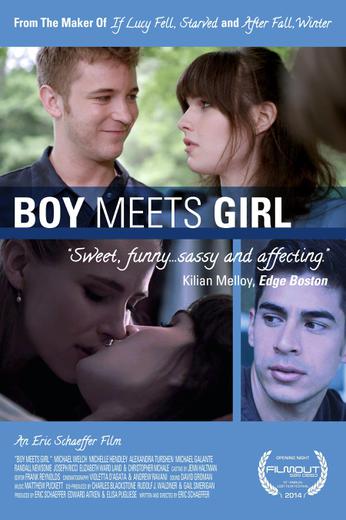Boy Meets Girl (2014)

| |
| Directed by | Eric Schaeffer |
|---|---|
| Running time | 1h 39m |
| Core concepts this week |
trans representation cisgender privilege |
| View on Amazon Prime | |
Film background
Boy Meets Girl was released in 2014. It was written and directed by Eric Schaeffer, who is a cisgender man. Schaeffer was adamant that the role of Ricky go to a transgender woman, explaining to Filmmaker Magazine, “Being an independent filmmaker, I had the latitude to cast a trans woman and not have to satisfy a studio (which would have ponied up a ton of money) by casting a famous cisgender man or cisgender woman, which likely they would have required. I felt it socially important that a trans woman play the trans part.” Schaeffer cast Michelle Hendley, who was in cosmetology school and had never acted before, but who had a YouTube channel in which she spoke openly about her identity, her interests, and her transition. The film was nominated for many LGBTQ film awards, including a GLAAD Media Award.
Plot summary
The film follows a 20-year old transgender woman, Ricky (Michelle Hendley), who lives in Kentucky and dreams of moving to New York to become a fashion designer. chats with her best friend, Robby (Michael Welch) and expresses her frustration with dating men. Then she meets Francesca, (Alexandra Turshen), a wealthy cisgender woman who is engaged to David (Michael Galante), a cisgender man who is a Marine serving in Afghanistan. At Robby’s urging, Ricky comes out as trans to Francesca; Francesca is not knowledgable about trans identity, but she is supportive. The two become friends and eventually lovers, despite Francesca’s engagement. When David returns home early from Afghanistan, he is enraged by Ricky and Francesca’s relationship, and it is later revealed that some of his anger stems from a past sexual encounter with Ricky, which he has kept secret. After deciding that she doesn’t love Francesca, and perhaps that dating Francesca would be risky considering Francesca’s conservative family’s overtures, Ricky has a fight with Robby, who says cruel things to her about her identity despite his lifelong support. Ricky’s younger brother, Sam (Joseph Ricci) shows Robby a video he found on her computer from seven years prior, in which she explained that her mother left the family because she didn’t accept Ricky’s identity, and that has led Ricky to acts of self-harm. Robby finds Ricky, and finally expresses to her that he was jealous of Francesca and he has romantic feelings for Ricky. The two begin dating. While Ricky gets rejected from a New York fashion school, Francesca and Robby start a crowdfunding campaign to help Ricky move to New York. She and Robby set off to pursue their dreams in the city, and Ricky posts the video from her childhood, which ends with an uplifting message. The film ends with a montage of many different people watching her video in support of her.
Content warnings
Boy Meets Girl contains brief nudity, references to self-harm, transphobic comments, and frank discussion of sexual acts.
Notes
- I’ve provided 3 clips/trailers from films mentioned by Julia Serano in Chapter 2 of Whipping Girl. Because the reading for Day 2’s class is short, you may want to also assign students to watch these videos before class, as it may give students a sense of the archetypes that Serano addresses in her reading.
- This week we will be reading essays from Julia Serano’s book, Whipping Girl. It might be worth noting for students that while many of her ideas are still highly relevant, some of her language is not widely used. For example, GLAAD explains about the word transsexual: “An older term that originated in the medical and psychological communities. Still preferred by some people who have permanently changed - or seek to change - their bodies through medical interventions, including but not limited to hormones and/or surgeries.” Unlike transgender, transsexual is not an umbrella term. Many transgender people do not identify as transsexual and prefer the word transgender. It is best to ask which term a person prefers. If preferred, use as an adjective: transsexual woman or transsexual man.” Similarly, while Serano’s chapter is titled “cissexual privilege,” today, most people refer to “cisgender privilege.”
- It may be worth discussing with students that this film, while notable in its casting of a trans woman actress for the lead role, was written and directed by a cisgender man. That there have been interesting critiques and debates about its representation of trans women and narrative development. If you have time, you could have students read different perspectives from LGBTQ media outlets like Them and Autostraddle to examine some of these questions.
Materials:
- Lesson plans [Word doc]
- Screening quiz [Word doc]
- Secondary texts:
- Day 1: Trans 101 Video (Watch in class)
- Day 2: The Crying Game Video Clip 1 - Fergus First Sees Dil (Watch before class)
- Day 2: The Crying Game Video Clip 2: After “The Reveal” (Watch before class)
- Day 2: Transamerica Trailer (Watch before class)
- Day 2: Serano, Julia. Whipping Girl: A Transsexual Woman on Sexism and the Scapegoating of Femininity. Seal Press, 2007. (Excerpt provided: Ch 2: “Skirt Chasers: Why The Media Depicts the Trans Revolution in Lipstick and Heels”) [pdf]
- Day 3: Serano, Julia. Whipping Girl: A Transsexual Woman on Sexism and the Scapegoating of Femininity. Seal Press, 2007. (Excerpt provided: Ch. 8: “Dismantling Cissexual Privilege”) [pdf]